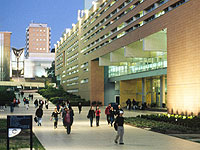Sustainable Built Environment - 5132
Program Summary
Faculty: Built Environment
Contact: Built Environment
Campus: Sydney
Career: Postgraduate
Typical UOC Per Semester: 24
Min UOC Per Semester: 6
Max UOC Per Semester: 24
Min UOC For Award: 48
Award(s):
Graduate Diploma in Sustainable Built Environment
View program information for previous years
Program Description
The program responds to the increasing demand for built environment and related professionals with the capacity to meet the growing challenges of sustainable development in Australia and the Asia-Pacific region and the expansion of specialised career opportunities in both the public and private sector.
The program is available to suitably qualified local and international students and provides opportunities for full-time or part-time study.
This program is also a pathway to Master of Sustainable Built Environment.
In addition to consideration of academic qualifications, relevant professional experience may be taken into account for entry. In exceptional circumstances, where an applicant does not hold a formal qualification in one of the identified cognate disciplines but has at least 5 years relevant professional experience, they may be considered for entry. Relevant professional experience would normally be in roles such as building designer, environmental planner, construction project manager, environmental/sustainability project officer, building sustainability/energy efficiency assessor or built environment consultant with an environmental/sustainability focus.
Applicants will need to demonstrate that they have achieved the same knowledge and skills (learning outcomes) through their formal or informal learning as the qualifications listed for entry for this program. This may be evidenced by qualification certificates, records of assessment activities relating to course or program learning outcomes, examples of experience from the workplace, community, or other context which demonstrate relevant skills, knowledge or competencies, membership (or eligibility for membership) of professional organisations which require attainment of certain qualifications, or testimonials of skills, knowledge or competencies from workplace supervisors. Any relevant documentation should be attached to the application and will be considered by the Program Director.
Program Objectives and Graduate Attributes
1. Demonstrate a clear and integrated understanding of concepts and principles of sustainability and their application in the built environment.
2. Apply research principles and methods applicable to sustainable development in local, national and international contexts.
3. Critically analyse, reflect on and synthesise complex information, problems, concepts and theories and apply established theories to practice.
4. Justify, interpret and communicate knowledge, skills and ideas to specialist and non-specialist audiences.
5. Apply knowledge and skills to demonstrate autonomy, expert judgement, adaptability and responsibility as a practitioner.
6. Demonstrate the qualities of an ethical practitioner.
7. Describe, explain and apply quantitative tools to implement and assess sustainability solutions.
8. Recognise and investigate how behaviours influence the sustainability of the built environment.
9. Demonstrate cultural awareness, environmental and social responsibility, and a respect for diversity.
Program Structure
Students are required to choose a minimum of 12 UOC from the free electives set out in List A, and are encouraged to choose the remaining units of credit from the free electives set out in List B. List A includes Sustainable Built Environment electives. List B includes existing electives from FBE and other Faculties which cover topics broadly relevant to built environment sustainability, and/or which students have historically frequently chosen. However, with agreement of the Program Director other suitable postgraduate electives may be selected from any UNSW Faculty, provided that the student meets any prerequisites set for the particular elective(s) they are selecting.
Students who have intentions to upgrade from the Graduate Diploma (5132) to the Master of Sustainable Built Environment (8132) (subject to meeting the required academic grades of credit average or higher) should complete BENV7020 Research Seminar in the Graduate Diploma, in place of an elective indicated in List A and List B. BENV7020 is a pre-requisite to SUSD0015 Graduate Research Project (Research Stream).
The schedule below is based on a full-time student commencing at the beginning of the year – note that that mid-year entry is also available.
- Electives (12 UOC)
- SUSD0002 Building Ecology (6 UOC)
- SUSD0003 Energy & the Built Environment (6 UOC)
- Electives (12 UOC)
- Electives (up to 12 UOC)
- ACCT5961 Reporting for Climate Change (6 UOC)
- CVEN9872 Solid Waste Management (6 UOC)
- CVEN9888 Environmental Management (6 UOC)
- CVEN9892 Sustainability & Risk Analysis (6 UOC)
- GBAT9103 Bus Mgt for a Sust Env (6 UOC)
- GEOS9011 Environmental Impact Assess't (6 UOC)
- IEST5001 Frameworks for Env. Mgt. (6 UOC)
- IEST5002 Tools for Env. Management (6 UOC)
- REST0006 Property Development (6 UOC)
- UDES0009 Urban Landscape & Heritage (6 UOC)
Academic Rules
Consideration of advanced standing may be granted for completed or partially completed postgraduate awards from UNSW or from another institution. When considering the granting of advanced standing on the basis of previous postgraduate study at another institution, the program authority will take into account the quality of the institution and the quality, level and content of postgraduate courses previously undertaken.
Upgrading and Articulation
The Graduate Certificate, Graduate Diploma and Masters programs are fully articulated programs which allow for flexibility in course selection and progression. A postgraduate coursework student enrolled in an articulated program may apply to progress from the Graduate Certificate through to Masters level with full credit for courses completed with a minimum 65 WAM in earlier programs in the sequence.
Fees
Area(s) of Specialisation










